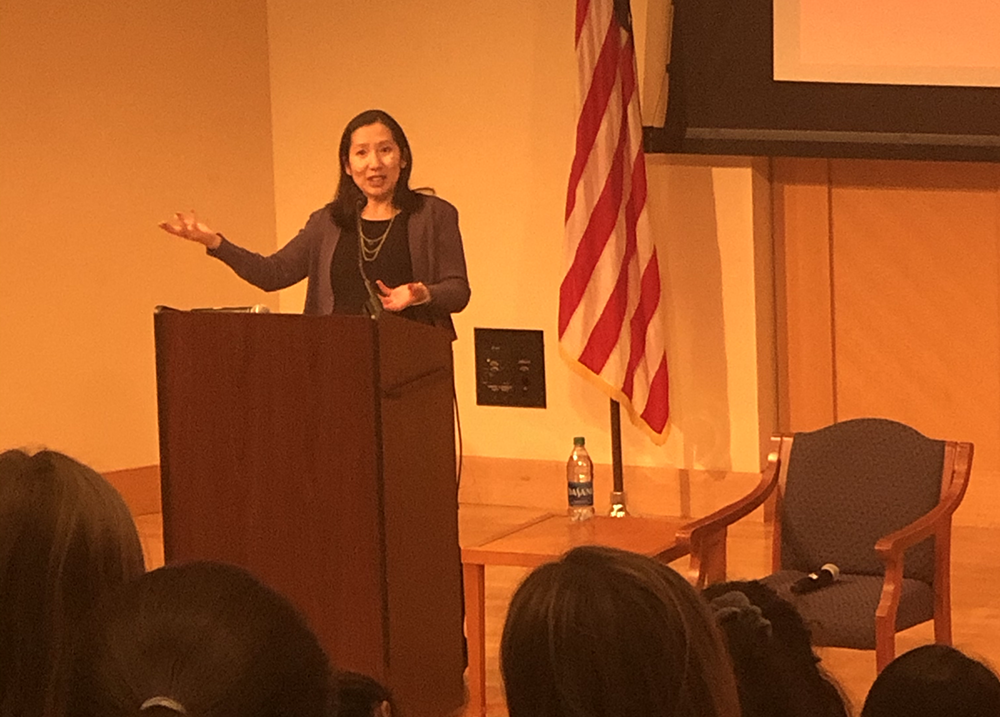Reproductive healthcare is in crisis as President Donald Trump’s administration continues to implement policies detrimental to public health, former President of Planned Parenthood Leana Wen said at an event Thursday.
The event, titled “Depoliticizing Women’s Health and the Future of Healthcare in America,” was hosted by the Georgetown University Lecture Fund and took place in the Lohrfink Auditorium.
At the event, Wen, who previously served as the health commissioner for the city of Baltimore, discussed her experiences as a physician and how they have influenced her perspective on women’s healthcare.

The politicization of reproductive healthcare damages broader conversations about U.S. healthcare reform, according to Wen.
“When was the last time you saw a title about depoliticizing men’s health? We don’t talk about it this way, and, frankly, none of these aspects of healthcare should be politicized,” Wen said.
Wen only served eight months in her position as the president of Planned Parenthood, as she was ousted by the board of directors in July 2019 because of disagreements over her desire to reorient the group’s focus from administering abortions toward its role as a women’s health provider, according to The New York Times.
Various Trump administration policies have deterred or prevented Americans from accessing basic healthcare services, Wen said. She referenced the administration’s public charge rule, a regulation that prevents some immigrants who use public services like Medicaid and the Supplemental Nutritional Assistance Program from achieving permanent legal status.
“The Trump administration’s public charge rule, I think is a good example of a policy that amplifies fear and deters people also from seeking life-saving care,” Wen said. “When I was growing up, we depended on Medicaid and food stamps. For us, these programs were not entitlements, they were literally our survival, and I can’t imagine where our family would be now if we were forced to make some unthinkable choices.”
Such policies have compromised reproductive healthcare across the country, impeding civilian participation in vital health programs, according to Wen.
“I think there should be no question that reproductive healthcare is another area that is in a state of emergency,” Wen said. “You have the Trump administration issuing a gag rule for Title X that would make it harder for low-income people to receive cancer screenings, birth control and STI tests.”
Title X is a federal program that provides birth control and other reproductive health services to four million Americans, according to Planned Parenthood. In May 2019, the Trump administration introduced changes to Title X law that would prevent family planning providers from receiving federal funding for providing or recommending abortions, according to WAMC, a public radio station.
The Trump administration’s obstructive policies pose the greatest threat to minorities and other marginalized communities, according to Wen.
“We know that those who are hurt the most by these types of policies are those who already bear the greatest brunt on disparities,” Wen said. “It’s going to be people of color, immigrants, families already struggling to make ends meet, it’s LGBTQ people, it’s the patients in communities that we serve.”
Such disparities in healthcare among minorities can immensely impact someone’s lifespan, which is why it is so crucial to call out these disparities and reduce them, according to Wen.
“It’s been said that the currency of inequality is years of life,” Wen said. “A child born today, depending on literally what zip code they’re born into, could be expected to live 85 years or 65 years.”
The next generation of voters must choose to depoliticize healthcare and push for greater accessibility to reproductive health resources, Wen added.
“We’re fighting for a world where the next generation has better health and more rights than we do,” Wen said. “I truly believe that it’s up to each of us to take action now, to focus on what we can do, to always aim for health equity, to stop the siloed and politicizing of healthcare.”




















